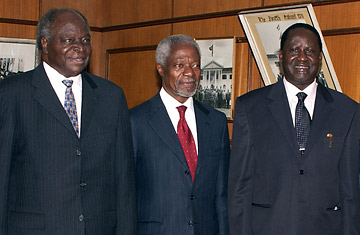
Kenyan President Mwai Kibai (left), former U.N. Secretary General Kofi Annan (center), and opposition leader Raila Odinga (right) pose prior to a meeting at Harambee house in Nairobi, Kenya, Friday, Feb. 8, 2008.
Former U.N. Secretary-General Kofi Annan announced Friday that Kenya's government and the opposition are close to reaching a power-sharing deal to resolve the political deadlock that sparked weeks of bloodshed. But after the chaos in which more than 1,000 people were killed and 300,000 have been displaced, it remains open to question whether a deal among politicians will be enough to restore the peace.
Annan, who has been mediating between the political rivals for more than a week, provided no details, but urged patience from those who have become increasingly pessimistic about Kenya's fate since the violence touched off by the disputed December 27 poll. While both sides showed some flexibility, it remains unclear how the deal brokered by Annan will address the central crux of the disagreement: President Mwai Kibaki says he rightfully won re-election in the December 27 vote, while Orange Democratic Movement leader Raila Odinga claims the vote was stolen from him.
"I think everyone realizes that we have a serious problem in the country," Annan said. "We also accept that we have to find a way of uniting and reconciling the nation."
The post-election chaos has effectively redrawn Kenya's demographic map, as tens of thousands of President Kibaki's fellow ethnic Kikuyus were forced to flee the fertile Rift Valley and further west including the city of Kisumu, which has, according to local accounts, come to govern itself entirely.
In retaliation, Kikuyus in other communities have driven out members of the Luo, Luhya and Kalenjin tribes, deemed to support Odinga, and these tensions continue to escalate. The United States has backtracked from U.S. Assistant Secretary of State for Africa Jendayi Frazer's characterization of the violence as "ethnic cleansing," but many Kenyans agreed with her.
Analysts say that the proposal on the table is one familiar in Kenyan political circles: amend the constitution to run more along the lines of a parliamentary democracy, with the president ceding many of his powers to the person who occupies the newly created post of prime minister. That would strip Kibaki of most of the awesome control he has over the state and make parliament more than just a talking shop. An attempt in 2005 to change the constitution failed, but observers believe the recent crisis may finally be concentrating the minds of Kenya's politicians.
"Kenya will have to accept that the constitution is not cast in stone, it was written by men, it can be changed by men and the radical situation we are in now requires very exceptional steps to hold the country together," says political analyst Ojwang Agina.
Constitutional change may be the only way out of the deadlock. The opposition has repeatedly called for a new vote, but it's difficult to see how that could occur now that so many tens of thousands of people have fled the towns where they once voted. A power-sharing deal is another option, but that might only work as a stop-gap measure to pave the way for more fundamental constitutional changes.
Annan's announcement may be a sign that pressure on the main parties to compromise after weeks of intransigence may finally be beginning to tell. On Friday, President Kibaki's government lifted a ban on public rallies that had been decried as unconstitutional. He has also backed off the rather peremptory argument he had made at an African Union summit in Ethiopia: that the opposition should seek redress from Kenya's judicial system, which happens to be firmly in the president's pocket.
And Odinga has shown at least a modicum of flexibility too, perhaps realizing that it may no longer be sufficient to insist that the presidency was stolen — which many observers say it very well may have been — and accept that Kibaki, whether elected legitimately or not, is still the president of the country, with all its resources behind him.
"We are saying that we are willing to give and take," Odinga told reporters Friday. "Initially our stand was that we won the elections, and Mr. Kibaki lost the elections, he should resign, and we should be sworn in, but we have said that we are not static on that point."
